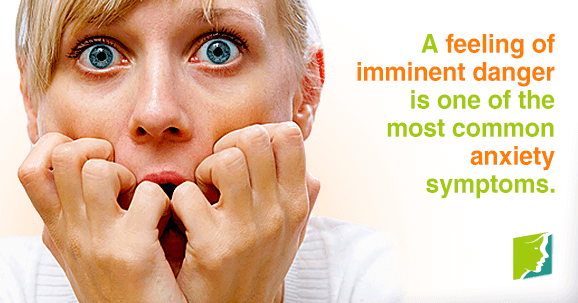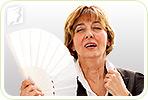Anxiety is a natural human response to a distressing event, and it's defined as an overwhelming feeling of unease. It is normally a short-term emotion to channel survival instinct when under threat, and in most people, it disappears after the danger has passed. However, a chronic state of anxiety can have a negative impact on general health and well-being. If an anxious feeling becomes a constant part of daily life, this is indicative of an anxiety disorder. The most common symptoms of anxiety are outlined below.
Symptoms
Anxiety releases hormones more appropriate for primitive “fight or flight” needs than modern-day stressors. Increased heartbeat and excessive sweating are useful if one needs to flee from a wild animal but are significantly less helpful when standing in a boardroom. Here are the key signs that you might be experiencing a clinical anxiety episode.
Irregular heartbeat
The increase in heart rate and blood flow is a result of the rush of adrenaline that occurs during an anxiety episode.
Muscle aches and tension
When in “fight or flight” mode, the muscles naturally contract. This can lead to muscle tension if you are in this state for too long.
Excessive sweating
As there is a risk of damage from overheating when heart rate and blood flow increase, sweating is activated to help cool the body down.
Feeling of imminent danger
This feeling can be brought on by many situations that an anxiety-free person would think irrational (e.g., things not being tidy or talking to strangers), and this can be compounded if a full-blown panic attack occurs. This can feel like a heart attack, leading to an understandable fear of death or serious harm.
Trembling or shaking
Shaking is another side effect of the adrenaline that pumps through the body at the height of an anxiety attack. Some people might also have long-lasting shakiness that occurs even when they are not faced with stressful events.
Difficulty concentrating
Concentration requires a lot of mental energy, and this is often in short supply when one is anxious. This is due to several factors, including loss of sleep, procrastinating as a coping mechanism, and rapid thoughts. If the brain is trying to process too many thoughts at once, it won't be able to focus on anything at all.
With drawl from social situations
Social withdrawal can be both a cause and a consequence of anxiety. The overwhelming urge to retreat from the world and avoid social situations could come from embarrassment at anxiety symptoms (such as panic attacks, trembling, or sweating), or it could be a symptom of social anxiety disorder, in which the individual experiences extreme stress when faced with social situations. In some people, pulling away from society for other reasons is what brings on the anxiety disorder.
Anxiety has a myriad of causes, and there are many different symptoms, as everybody will react differently to the situations around them. There are a few telltale signs that most anxiety sufferers will experience, and they can be embarrassing, irritating, or even frightening. It is important to seek professional help if you feel you might be suffering from anxiety.
Sources
- Anxiety and Depression Association of America. (2014). Symptoms. Retrieved July 21, 2014, from http://www.adaa.org/understanding-anxiety/panic-disorder-agoraphobia/symptoms/
- National Health Service UK. (2014). Heart attack. Retrieved July 21, 2014, fromhttp://www.nhs.uk/conditions/heart-attack/Pages/Introduction.aspx
- Natural Health Service UK. (2013). What Is a Panic Attack? Retrieved July 21, 2014, fromhttp://www.nhs.uk/conditions/stress-anxiety-depression/pages/understanding-panic-attacks.aspx
- National Institute of Mental Health. (2014). What Is Anxiety Disorder? Retrieved July 21, 2014, from http://www.nimh.nih.gov/health/topics/anxiety-disorders/index.shtml
- University of Michigan Health Service. (n.d.). Anxiety Disorders and Panic Attacks. Retrieved July 21, 2014, from http://www.uhs.umich.edu/anxietypanic




